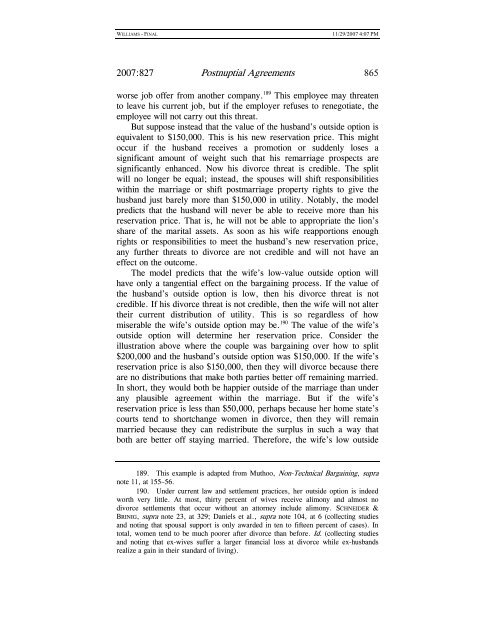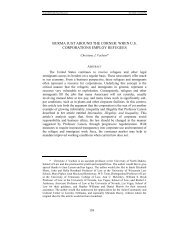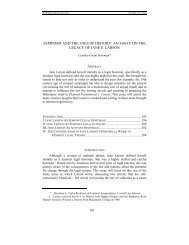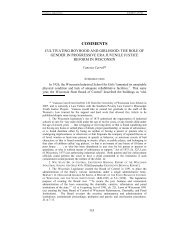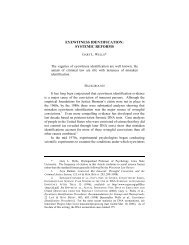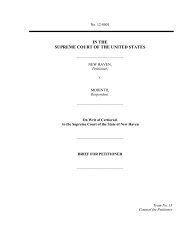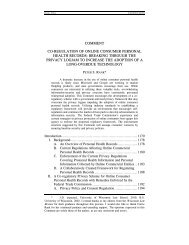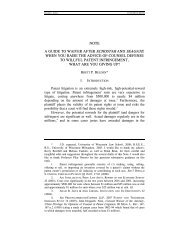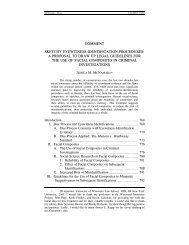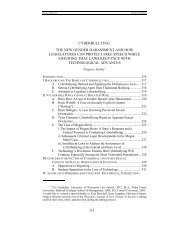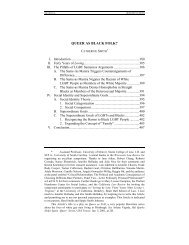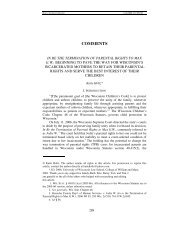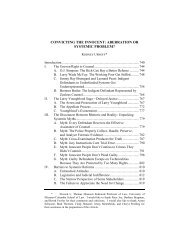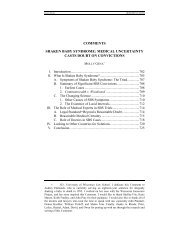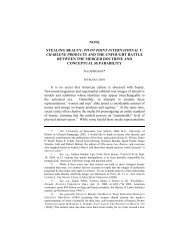POSTNUPTIAL AGREEMENTS - UW Law School
POSTNUPTIAL AGREEMENTS - UW Law School
POSTNUPTIAL AGREEMENTS - UW Law School
You also want an ePaper? Increase the reach of your titles
YUMPU automatically turns print PDFs into web optimized ePapers that Google loves.
WILLIAMS - FINAL 11/29/2007 4:07 PM<br />
2007:827 Postnuptial Agreements 865<br />
worse job offer from another company. 189 This employee may threaten<br />
to leave his current job, but if the employer refuses to renegotiate, the<br />
employee will not carry out this threat.<br />
But suppose instead that the value of the husband’s outside option is<br />
equivalent to $150,000. This is his new reservation price. This might<br />
occur if the husband receives a promotion or suddenly loses a<br />
significant amount of weight such that his remarriage prospects are<br />
significantly enhanced. Now his divorce threat is credible. The split<br />
will no longer be equal; instead, the spouses will shift responsibilities<br />
within the marriage or shift postmarriage property rights to give the<br />
husband just barely more than $150,000 in utility. Notably, the model<br />
predicts that the husband will never be able to receive more than his<br />
reservation price. That is, he will not be able to appropriate the lion’s<br />
share of the marital assets. As soon as his wife reapportions enough<br />
rights or responsibilities to meet the husband’s new reservation price,<br />
any further threats to divorce are not credible and will not have an<br />
effect on the outcome.<br />
The model predicts that the wife’s low-value outside option will<br />
have only a tangential effect on the bargaining process. If the value of<br />
the husband’s outside option is low, then his divorce threat is not<br />
credible. If his divorce threat is not credible, then the wife will not alter<br />
their current distribution of utility. This is so regardless of how<br />
miserable the wife’s outside option may be. 190 The value of the wife’s<br />
outside option will determine her reservation price. Consider the<br />
illustration above where the couple was bargaining over how to split<br />
$200,000 and the husband’s outside option was $150,000. If the wife’s<br />
reservation price is also $150,000, then they will divorce because there<br />
are no distributions that make both parties better off remaining married.<br />
In short, they would both be happier outside of the marriage than under<br />
any plausible agreement within the marriage. But if the wife’s<br />
reservation price is less than $50,000, perhaps because her home state’s<br />
courts tend to shortchange women in divorce, then they will remain<br />
married because they can redistribute the surplus in such a way that<br />
both are better off staying married. Therefore, the wife’s low outside<br />
189. This example is adapted from Muthoo, Non-Technical Bargaining, supra<br />
note 11, at 155–56.<br />
190. Under current law and settlement practices, her outside option is indeed<br />
worth very little. At most, thirty percent of wives receive alimony and almost no<br />
divorce settlements that occur without an attorney include alimony. SCHNEIDER &<br />
BRINIG, supra note 23, at 329; Daniels et al., supra note 104, at 6 (collecting studies<br />
and noting that spousal support is only awarded in ten to fifteen percent of cases). In<br />
total, women tend to be much poorer after divorce than before. Id. (collecting studies<br />
and noting that ex-wives suffer a larger financial loss at divorce while ex-husbands<br />
realize a gain in their standard of living).


